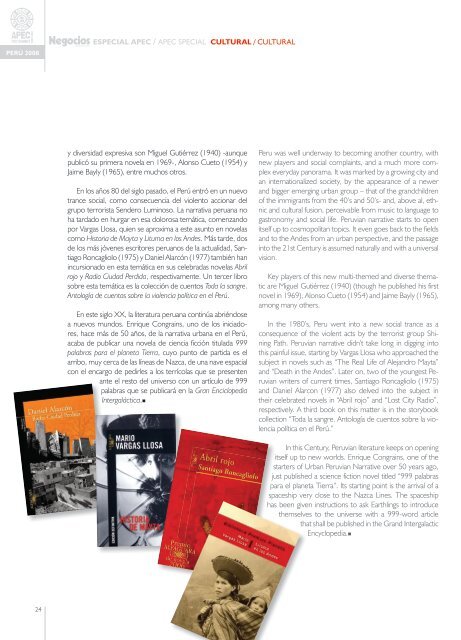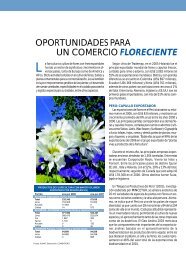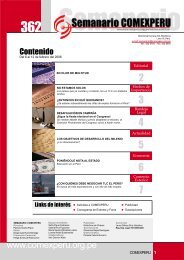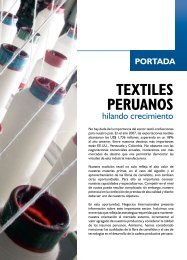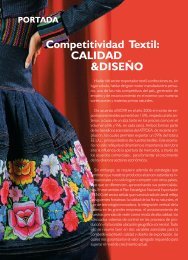You also want an ePaper? Increase the reach of your titles
YUMPU automatically turns print PDFs into web optimized ePapers that Google loves.
PERÚ 2008<br />
24<br />
ESPECIAL APEC / APEC SPECIAL CuLTuRAL / CuLturAL<br />
y diversidad expresiva son Miguel Gutiérrez (1940) -aunque<br />
publicó su primera novela en 1969-, Alonso Cueto (1954) y<br />
Jaime Bayly (1965), entre muchos otros.<br />
En los años 80 del siglo pasado, el Perú entró en un nuevo<br />
trance social, como consecuencia del violento accionar del<br />
grupo terrorista Sendero Luminoso. La narrativa peruana no<br />
ha tardado en hurgar en esa dolorosa temática, comenzando<br />
por Vargas Llosa, quien se aproxima a este asunto en novelas<br />
como Historia de Mayta y Lituma en los Andes. Más tarde, dos<br />
de los más jóvenes escritores peruanos de la actualidad, Santiago<br />
Roncagliolo (1975) y Daniel Alarcón (1977) también han<br />
incursionado en esta temática en sus celebradas novelas Abril<br />
rojo y Radio Ciudad Perdida, respectivamente. Un tercer libro<br />
sobre esta temática es la colección de cuentos Toda la sangre.<br />
Antología de cuentos sobre la violencia política en el Perú.<br />
En este siglo XX, la literatura peruana continúa abriéndose<br />
a nuevos mundos. Enrique Congrains, uno de los iniciadores,<br />
hace más de 50 años, de la narrativa urbana en el Perú,<br />
acaba de publicar una novela de ciencia ficción titulada 999<br />
palabras para el planeta Tierra, cuyo punto de partida es el<br />
arribo, muy cerca de las líneas de Nazca, de una nave espacial<br />
con el encargo de pedirles a los terrícolas que se presenten<br />
ante el resto del universo con un artículo de 999<br />
palabras que se publicará en la Gran Enciclopedia<br />
Intergaláctica.n<br />
Peru was well underway to becoming another country, with<br />
new players and social complaints, and a much more complex<br />
everyday panorama. It was marked by a growing city and<br />
an internationalized society, by the appearance of a newer<br />
and bigger emerging urban group – that of the grandchildren<br />
of the immigrants from the 40’s and 50’s- and, above al, ethnic<br />
and cultural fusion, perceivable from music to language to<br />
gastronomy and social life. Peruvian narrative starts to open<br />
itself up to cosmopolitan topics. It even goes back to the fields<br />
and to the Andes from an urban perspective, and the passage<br />
into the 21st Century is assumed naturally and with a universal<br />
vision.<br />
Key players of this new multi-themed and diverse thematic<br />
are Miguel Gutiérrez (1940) (though he published his first<br />
novel in 1969), Alonso Cueto (1954) and Jaime Bayly (1965),<br />
among many others.<br />
In the 1980’s, Peru went into a new social trance as a<br />
consequence of the violent acts by the terrorist group Shining<br />
Path. Peruvian narrative didn’t take long in digging into<br />
this painful issue, starting by Vargas Llosa who approached the<br />
subject in novels such as “The Real Life of Alejandro Mayta”<br />
and “Death in the Andes”. Later on, two of the youngest Peruvian<br />
writers of current times, Santiago Roncagliolo (1975)<br />
and Daniel Alarcon (1977) also delved into the subject in<br />
their celebrated novels in “Abril rojo” and “Lost City Radio”,<br />
respectively. A third book on this matter is in the storybook<br />
collection “Toda la sangre. Antología de cuentos sobre la violencia<br />
política en el Perú.”<br />
In this Century, Peruvian literature keeps on opening<br />
itself up to new worlds. Enrique Congrains, one of the<br />
starters of Urban Peruvian Narrative over 50 years ago,<br />
just published a science fiction novel titled “999 palabras<br />
para el planeta Tierra”. Its starting point is the arrival of a<br />
spaceship very close to the Nazca Lines. The spaceship<br />
has been given instructions to ask Earthlings to introduce<br />
themselves to the universe with a 999-word article<br />
that shall be published in the Grand Intergalactic<br />
Encyclopedia.n


